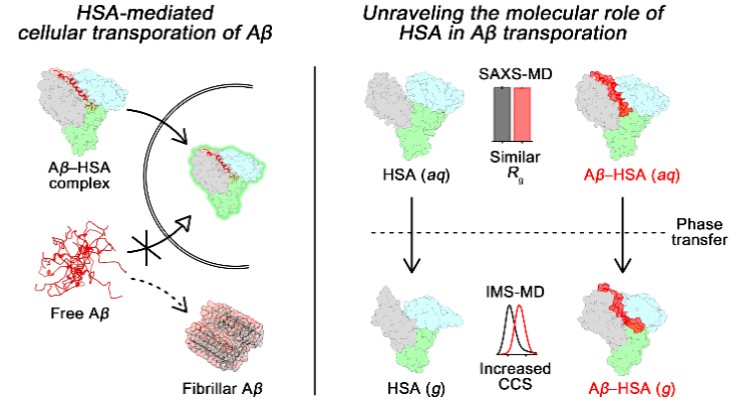| author | Hugh I. Kim |
|---|---|
| journal | J. Am. Chem. Soc., Just Accepted Manuscript(DOI: 10.1021/jacs.7b08584) |
| Homepage | https://sites.google.com/site/hughkimgroup/ |

Tae Su Choi(Post doc.)
Regulation of amyloid-β (Aβ) aggregation by metal ions and proteins is
essential for
understanding the pathology of Alzheimer’s disease (AD). Human serum albumin
(HSA), a regulator of metal and protein transportation, can modulate metal–Aβ interactions and Aβ aggregation in human fluid; however, the
molecular mechanisms for such activities remain unclear. Herein, we report the
molecular-level complexation between Zn(II), Cu(II), Aβ, and HSA, which is able to alter
the aggregation and cytotoxicity of Aβ peptides and induce their cellular
transportation. In addition, a single Aβ monomer
bound to HSA is observed with the structural change of Aβ from a random coil to an α-helix.
Small-angle X-ray scattering (SAXS) studies indicate that Aβ–HSA complexation causes no structural
variation of HSA in solution. Conversely, ion mobility mass spectrometry
(IM-MS) results present that Aβ prevents the shrinkage of the
V-shaped groove of HSA in the gas phase. Consequently, for the first time, HSA is demonstrated to predominantly capture a
single Aβ monomer at the groove using the
phase transfer of a protein heterodimer from solution to the gas phase.
Moreover, HSA sequesters Zn(II) and Cu(II) from Aβ
while maintaining HSA–Aβ interaction.
Therefore, HSA is capable
of controlling metal-free and metal-bound Aβ
aggregation and aiding the cellular transportation of Aβ via Aβ–HSA complexation. The overall
results and observations regarding HSA, Aβ, and metal ions
advance our knowledge of how protein-protein interactions associated with Aβ and metal ions could be linked to AD pathogenesis.

http://pubs.acs.org/doi/10.1021/jacs.7b08584
-
Read More

Mid-Infrared Intraband Transition of Metal Excess Colloidal Ag2Se Nanocrystals
Mihyeon Park(석사과정) Dongsun Choi(박사과정) Steady-state intraband transition, which is a promising electronic transition of a colloidal quantum dot along with the band-gap transition, had been a long-standing challenge. The steady-state ... -
Read More

Enhanced Electron Transfer Mediated by Conjugated Polyelectrolyte and Its Application to Washing-Free DNA Detection
Ji-Eun Jeong (박사과정) Direct electron transfer between a redox label and an electrode requires a very short working distance (<1-2 nm), and in general an affinity biosensor based on the direct electron transfer requires a finely smoothed ... -
Read More

Vertex-reinforced PtCuCo ternary nanoframes as efficient and stable electrocatalysts for the oxygen reduction reaction and the methanol oxidation reaction
Taehyun Kwon(박사과정) / Minki Jun (박사과정) Noble metal binary alloy nanoframes have emerged as a new class of fuel cell electrocatalysts because of their intrinsic high catalytic surface area and accompanied high catalytic activity. Howe... -
Read More

Molecular Role of Ca2+ and Hard Divalent Metal Cations on Accelerated Fibrillation and Interfibrillar Aggregation of α-Synuclein
Jong Yoon Han(박사과정) / Tae Su Choi(Post doc.) α-Synuclein (αSyn) is an intrinsically disordered protein, the aggregation of which is highly related to the pathology of diverse α-synucleinopathies. Various hard divalent metal cations have... -
Read More

Supramolecular Modulation of Structural Polymorphism in Pathogenic α-Synuclein Fibrils Using Cu(II) Coordination
Tae Su Choi(Post doc.) / Jong Yoon Han(박사과정) Structural variation of α-synuclein (αSyn) fibrils has been linked to the diverse etiologies of synucleinopathies. However, little is known about what specific mechanism provides αSyn fibrils... -
Read More

Recent Progress in the Chemistry of Pyridazinones for Functional Group Transformations
Seohyun Kang(석사과정) While N-hetereocycles have received significant attention in organic synthesis and other research fields, the chemistry of pyridazine, six-membered aromatic ring with adjacent two nitrogen atoms, and its derivatives ... -
Read More

Maskless Arbitrary Writing of Molecular Tunnel Junctions
Seo Eun Byeon(석사과정) / Miso Kim(석사과정) Since fabricating geometrically well-defined, noninvasive, and compliant electrical contacts over molecular monolayers is difficult, creating molecular-scale electronic devices that function in h... -
Read More

Single Component Organic Solar Cells Based on Oligothiophene-Fullerene Conjugate
Thanh Luan Nguyen(Post doc.) A new donor (D)–acceptor (A) conjugate, benzodithiophene-rhodanine–[6,6]-phenyl-C61 butyric acid methyl ester (BDTRh–PCBM) comprising three covalently linked blocks, one of p-type oligothiophene containing BDTRh... -
Read More

Lanthanide metal-assisted synthesis of rhombic dodecahedral MNi (M=Ir and Pt) nanoframes toward efficient oxygen evolution catalysis
Haneul Jin(박사과정) / Yongju Hong(박사과정) Mixed metal alloy nanoframeworks have shown a great promise as electrocatalysts in water electrolyzers and fuel cells. Although a limited number of mixed metal alloy nanoframeworks have been synt... -
Read More

Radially Phase Segregated PtCu@PtCuNi Dendrite@Frame Nanocatalyst for the Oxygen Reduction Reaction
Hyukbu Kwon(석사과정) / Jongsik Park(박사과정) Pt-based alloy nanoframes have shown a great potential as electrocatalysts toward oxygen reduction reaction (ORR) in fuel cells. However, the intrinsically infirm nanoframes could be severely d... -
Read More

Collision Cross Sections and Ion Structures: Development of a General Calculation Method via High-quality Ion Mobility Measurements and Theoretical Modeling
Ion mobility mass spectrometry (IM-MS) has become an important tool for the structural investigation of ions in the gas phase. Accurate theoretical evaluation of ion collision cross sections (CCSs) is essential for the effective application... -
Read More

Total Syntheses of Arcyriaflavin A and Calothrixin B Using 2,2′-Bisindole-3-acetic Acid Derivative as a Common Intermediate
Sungjong Lee(석사과정) / Kyung-Hee Kim(박사과정) A new protocol for the synthesis of 2,2′-bisindole-3-acetic acid derivatives from aldimines derived from 2-aminocinnamic acid derivatives and indole-2-carboxaldehyde was developed via a cyani... -
Read More

Synthesis, Characterization, and Efficient Catalytic Activities of a Nickel(II) Porphyrin: Remarkable Solvent and Substrate Effects on Participation of Multiple Active Oxidants
A new nickel(II) porphyrin complex, [NiII(porp)] (1), has been synthesized and characterized by 1H NMR, 13C NMR and mass spectrometry analysis. This NiII porphyrin complex 1 quantitatively catalyzed the epoxidation reaction of a wide range o... -
Read More

Molecular Insights into Human Serum Albumin as a Receptor of Amyloid-β in the Extracellular Region
Tae Su Choi(Post doc.) Regulation of amyloid-β (Aβ) aggregation by metal ions and proteins is essential for understanding the pathology of Alzheimer’s disease (AD). Human serum albumin (HSA), a regulator of metal and protein transportation,... -
Read More

Two Regioisomeric π-Conjugated Small Molecules: Synthesis, Photophysical, Packing and Optoelectronic Properties
Two Regioisomeric π-Conjugated Small Molecules: Synthesis, Photophysical, Packing and Optoelectronic Properties Dae Hee Lee(박사과정) / Thanh Luan Nguyen(Post doc.) Two regioisomeric D1-A-D-A-D1 type π-conjugated molecules (1,4-bis{5-[4-(5-f... -
Read More

Major Electronic Transition Shift from Bandgap to Localized Surface Plasmon Resonance in CdxHg1-xSe Alloy Nanocrystals
Dongsun Choi(박사과정) / Bitna Yonn(석사과정) CdxHg1-xSe alloy nanocrystals are obtained from CdSe semiconductor nanocrystals via cation exchange. By varying the composition during the exchange process, the CdxHg1-xSe alloy nanocrystals off... -
Read More

Rational Design of In Vivo Tau Tangle-Selective Near Infrared Fluorophores: Expanding the BODIPY Universe
The elucidation of the cause of Alzheimer’s disease remains one of the greatest questions in neurodegenerative research. The lack of highly reliable low-cost sensors to study the structural changes in key proteins during the progres-sion of ... -
Read More

Achieving Highly Efficient Nonfullerene Organic Solar Cells with Improved Intermolecular Interaction and Open-Circuit Voltage
A new acceptor–donor–acceptor-structured nonfullerene acceptor ITCC (3,9-bis(4-(1,1-dicyanomethylene)-3-methylene-2-oxo-cyclopenta[b]thiophen)-5,5,11,11-tetrakis(4-hexylphenyl)-dithieno[2,3-d′:2,3-d′]-s-indaceno[1,2-b:5,6-b′]-dithiophene) is... -
Read More

Ionic effect on the excited-state proton transfer reactions in aqueous solutions
Proton dissociation (PD) reactions of weak acids and proton transfer (PT) processes in aqueous solution are strongly influenced by ions. However, a detailed molecular picture that describes how ions affect the rates for PD and PT processes i... -
Read More

A conductive porous organic polymer with superprotonic conductivity of a Nafion-type electrolyte
As potential solid electrolytes in fuel cells, porous organic polymers show compelling proton conductivities (up to ∼10−2 S cm−1), but even higher performance is required for real applications. In this work, we prepared a biphenyl-based orga...


 Synthesis, Characterization, and Efficient Catalytic Activiti...
Synthesis, Characterization, and Efficient Catalytic Activiti...
 Two Regioisomeric π-Conjugated Small Molecules: Synthesis, Ph...
Two Regioisomeric π-Conjugated Small Molecules: Synthesis, Ph...